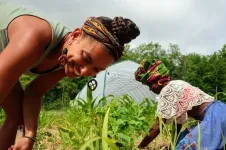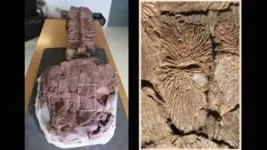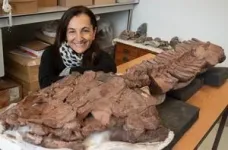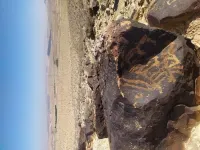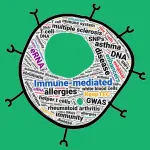(Press-News.org) Agroecology—a science, practice, and movement which seeks social, political, economic, and environmental sustainability in the global food system—is gaining momentum in the U.S., according to a new Dartmouth-led commentary in Nature Food. As the co-authors report, the approach requires coordination between scientists, farmers, and activists.
"When it comes to sustainable food and agriculture, people in the U.S. tend to be more familiar with organic farming, the production of food without synthetic inputs, and regenerative agriculture, which primarily strives to restore soil health," says lead author Theresa Ong, an assistant professor of environmental studies at Dartmouth.
"Agroecology is different, as it strives to achieve both ecological and social sustainability of food systems without sacrificing one for the other. We cannot save biodiversity and ecosystem integrity without also preserving farmer livelihoods and ensuring that the food systems we create provide food that is culturally relevant to local communities, and not simply meeting a calorie quota," says Ong.
Supporters of agroecology say the U.S. food system is dominated by industrial agriculture, which is characterized by monoculture production, reliance on agrochemicals like pesticides and fertilizers, and advanced technology and machinery that depend heavily on fossil fuels.
Prior research has found that challenges facing global food systems—which include food insecurity, public health crises, biodiversity loss, and climate change—are perpetuated in part by the U.S. food system and the political influence of its big players.
For decades, many in the U.S. and beyond have called for transforming the industrial food system. The United Nations has promoted agroecology as the mechanism to achieve that transformation.
Despite its growing international reputation, agroecology was slow to gain recognition beyond academic circles in the U.S.
But staff from the U.S. Department of Agriculture asked agroecologists to convene a U.S. Agroecology Summit in 2023, which brought together 100 stakeholders in the food system to discuss promoting research of this kind in the country.
Participants discussed the need for equitable representation and support for all food system stakeholders including agricultural practitioners, food systems changemakers, and scientists, and increased access to funding and ethical approaches to research.
"'Food sovereignty'—the right to define, produce, and access healthy food that is culturally appropriate and preserves the ways of life of farmers, is a critical goal in agroecology and was first defined by La Vía Campesina, an international peasant movement, in 1996," says Ong, who was a participant at the summit.
The Agroecology Summit builds on momentum that has been growing over the last 15 years, with the establishment of the nonprofit U.S. Food Sovereignty Alliance in 2010 and enactment of food sovereignty laws in eight states (Maine, Vermont, Massachusetts, Georgia, North Carolina, Utah, Wyoming, and Montana). In addition, agroecology institutes were created at Florida A&M University in 2022 and University of Vermont in 2023.
Much work still needs to be done to ensure that all voices are represented and have decision-making power in this space, who may share many of the same values and goals like large and small farmers, family farmers, migrant farmers, Black and Indigenous farmers, and farm workers, according to the co-authors.
"Agroecology is about building coalitions to ensure equitable representation and coordination between farmers, activists, and academics," says Ong.
Antonio Roman-Alcalá at California State University, East Bay; Estelí Jiménez-Soto at University of South Florida; Erin Jackson at Colorado State University; Ivette Perfecto at University of Michigan; and Hannah Duff at Montana State University; also contributed to the commentary.
Ong is available for comment at: theresa.w.ong@dartmouth.edu.
END
Why the U.S. food system needs agroecology
2024-07-05
ELSE PRESS RELEASES FROM THIS DATE:
Fresh wind blows from historical supernova
2024-07-05
A mysterious remnant from a rare type of supernova recorded in 1181 has been explained for the first time. Two white dwarf stars collided, creating a temporary “guest star,” now labeled supernova (SN) 1181, which was recorded in historical documents in Japan and elsewhere in Asia. However, after the star dimmed, its location and structure remained a mystery until a team pinpointed its location in 2021. Now, through computer modeling and observational analysis, researchers have recreated the structure of the remnant white dwarf, a rare occurrence, explaining its ...
Desert-loving fungi and lichens pose deadly threat to 5,000-year-old rock art
2024-07-05
The Negev desert of southern Israel is renowned for its unique rock art. Since at least the third millennium BCE, the hunters, shepherds, and merchants who roamed the Negev have left thousands of carvings (‘petroglyphs’) on the rocks. These figures are mostly cut into ‘desert varnish’: a thin black coating on limestone rock, which forms naturally. Many represent animals such as ibexes, goats, horses, donkeys, and domestic camels, but abstract forms also occur.
Now, a study published in Frontiers in Fungal ...
Scientists map how deadly bacteria evolved to become epidemic
2024-07-04
Pseudomonas aeruginosa – an environmental bacteria that can cause devastating multidrug-resistant infections, particularly in people with underlying lung conditions – evolved rapidly and then spread globally over the last 200 years, probably driven by changes in human behaviour, a new study has found.
P. aeruginosa is responsible for over 500,000 deaths per year around the world, of which over 300,000 are associated with antimicrobial resistance (AMR). People with conditions such as COPD (smoking-related lung damage), cystic fibrosis (CF), and non-CF bronchiectasis, are particularly susceptible.
How P. aeruginosa evolved from an environmental organism into a ...
Biodegradable biomass-based aerogel for sustainable radiative cooling
2024-07-04
An aerogel made from gelatin and DNA surpasses 100% solar reflectance, yielding exceptional radiative cooling, a new study reports. It is also biodegradable. The novel approach paves the way for high-performance next-generation radiative cooling materials, promoting environmentally friendly advancements in the field. Sustainable, energy-efficient, and environmentally conscious cooling technologies are crucial for adapting to our rapidly warming world. Compared to traditional refrigeration systems, passive radiative cooling technologies consume less energy and emit fewer greenhouse gasses, making them ...
New brain-to-nerve signaling mechanism reveals potential path to migraine pain
2024-07-04
The rapid influx of cerebral spinal fluid (CSF) and protein solutes released during cortical spreading depression (CSD) in the brain activates neurons to trigger aural migraine headaches, according to a new mouse study. The findings identify a novel non-synaptic signaling mechanism between the brain and peripheral sensory system important for migraine. They also suggest potential pharmacological targets for treating the painful disorder. Migraine with aura, or an aural migraine, is a distinct headache disorder that can include sensory disturbances, such as hearing- or vision-related symptoms that precede onset of ...
Federal grid reforms alone are not enough to solve clean energy interconnection problem
2024-07-04
Although energy production from wind and solar has grown rapidly in the United States, its integration into the national electric grid has been impeded by poor grid interconnection policies, leaving thousands of new facilities for generating renewable energy waiting to be connected to the grid. In a Policy Forum, Les Armstrong and colleagues highlight the interconnection problem and discuss whether federal grid policy reforms alone are enough to address it. Armstrong et al. argue that while the US Federal Energy Regulatory Commission’s (FERC) recent orders to improve this bottleneck are a step in the right direction, fundamental issues remain unaddressed. In the ...
Uncovering “blockbuster T cells” in the gut wins NOSTER & Science Microbiome Prize
2024-07-04
In the gut, dozens of strains of bacteria exert different effects on the immune system that in turn impact our health – fending off pathogens, helping digest food and maybe even influencing behavior. But pinpointing which bacteria exert which effects has been challenging. Better understanding this process could lead to a powerful way to treat a host of diseases. For developing a method by which to zero in on individual gut bacterium’s impacts on T cells, Kazuki Nagashima, a senior research scientist at Stanford University, is the winner of this year’s NOSTER & Science Microbiome ...
Study reveals brain fluid dynamics as key to migraine mysteries, new therapies
2024-07-04
New research describes for the first time how a spreading wave of disruption and the flow of fluid in the brain triggers headaches, detailing the connection between the neurological symptoms associated with aura and the migraine that follows. The study also identifies new proteins that could be responsible for headaches and may serve as foundation for new migraine drugs.
“In this study, we describe the interaction between the central and peripheral nervous system brought about by increased concentrations of proteins released ...
Scientists discover new T cells and genes related to immune disorders
2024-07-04
Researchers led by Yasuhiro Murakawa at the RIKEN Center for Integrative Medical Sciences (IMS) and Kyoto University in Japan and IFOM ETS in Italy have discovered several rare types of helper T cells that are associated with immune disorders such as multiple sclerosis, rheumatoid arthritis, and even asthma. Published July 4 in Science, the discoveries were made possible by a newly developed technology they call ReapTEC, which identified genetic enhancers in rare T cell subtypes that are linked to specific immune ...
The dawn of the Antarctic ice sheets
2024-07-04
In recent years global warming has left its mark on the Antarctic ice sheets. The "eternal" ice in Antarctica is melting faster than previously assumed, particularly in West Antarctica more than East Antarctica. The root for this could lie in its formation, as an international research team led by the Alfred Wegener Institute has now discovered: sediment samples from drill cores combined with complex climate and ice-sheet modelling show that permanent glaciation of Antarctica began around 34 million years ago – ...
